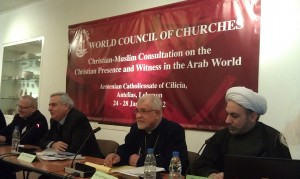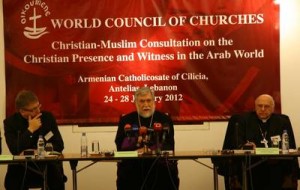In letters to Christian church leaders in Syria, the Rev. Mark S. Hanson, presiding bishop of the Evangelical Lutheran Church in America (ELCA), offered his support of the churches’ collective call for an end to violence and his prayers for the people in the region.
“In these difficult days, I will continue to pray and encourage members of the Evangelical Lutheran Church in America to pray for you and your efforts to sustain the courage and faith of your communities,” wrote Hanson. In addition to prayers for the people of Syria, the presiding bishop said he mourns the recent death of a priest there, “who died serving others.”

Participants in the WCC meeting on Muslim-Christian Relations
As the violence in Syria continues, Hanson acknowledged in his letters that there are no simple answers to resolve the current situation, and therefore agrees with many Syrian church leaders on the need for dialogue instead of further fighting.
“We who are at ‘the ends of the earth’ cannot forget the importance of Syria for the growth of our faith or the communities of disciples keeping the faith in the land of Christianity’s birth,” Hanson wrote. “We affirm, with you, that the Christian communities in Syria are an essential component to the fabric of Syrian culture and history.”
At the conclusion of his letter, Hanson said he will pray for the efforts of Syrian church leaders toward renewing and strengthening their relationships with Muslim neighbors, and he asked how the ELCA might assist church leaders and the people of Syria.
“We know that well-meaning actions can sometimes result in unintended negative consequences, thus we seek your guidance. In this critical time, we hope to do all we can to strengthen your callings to be ministers of reconciliation in your land,” wrote Hanson.
The Rev. Robert Smith, Area Program Director for the Middle East & North Africa, was attending a World Council of Churches on Christian meeting in Beirut about Christian and Muslim relations when the letter was released. He read the message to the group of about 40 Christians and Muslims gathered from throughout the region, including participants from Syria. The letter was received as an important message from a church leader in the U.S. that respected the complexity of the ongoing situation in Syria while offering heart-felt solidarity. Since then, Bishop Hanson has received responses from Syrian church leaders expressing similar thoughts.

